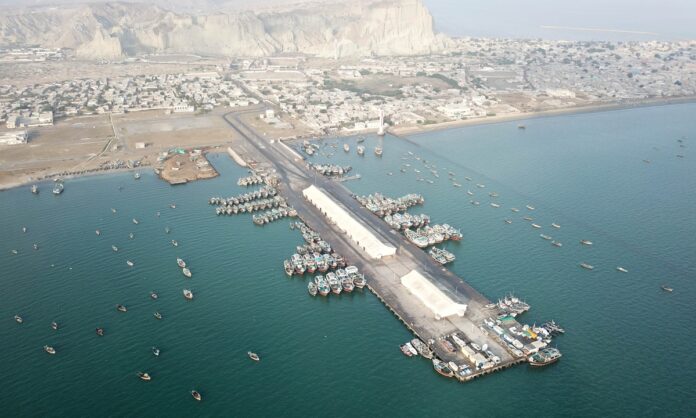Pakistan’s Struggle Between Superpowers: Navigating a Precarious Position
Pakistan is currently trapped in a complex geopolitical struggle involving the United States and China, two rival global powers. Leaked documents reveal that Pakistan has permitted China to build a militarized naval base at Gwadar, a critical location for international maritime activity. The country’s decision to grant this strategic concession to China highlights the economic instability and political pressures Pakistan faces today. In doing so, Pakistan is attempting to balance relationships with two global powers that hold contrasting objectives and interests. This maneuver showcases Pakistan’s desperate need for external support and its vulnerable geopolitical position.
US Involvement in Imran Khan’s Ouster
Imran Khan’s removal as Pakistan’s prime minister illustrates the lengths to which the United States will go to protect its interests. Khan refused to allow US drone operations within Pakistani borders, a policy that irked US officials significantly. Additionally, his neutral stance on the Russia-Ukraine conflict put him at odds with Western powers seeking a unified global response. In response, the US helped orchestrate his ouster, ensuring that a more compliant regime would take his place. The Pakistani military, which controls much of the country’s foreign policy, played a crucial role in facilitating Khan’s removal from office.
The Strategic Value of Gwadar Port
Gwadar Port sits in one of the most strategically important regions globally, near the Strait of Hormuz, a major shipping route. Its location makes it vital for controlling maritime trade and military movements across key global waterways. The United States has long eyed Gwadar with suspicion, understanding the significant influence China could gain through a militarized port there. Pakistan’s decision to allow China to build this base marks a major shift in regional dynamics and signals growing Chinese dominance in the region. This move presents both economic opportunities for Pakistan and military advantages for China, heightening tensions in the region.
Pakistan’s Economic Desperation
Pakistan’s economy has been in freefall, plagued by rampant inflation, widespread poverty, and frequent energy blackouts. The military, which controls a significant portion of the nation’s economy, has used its relationships with foreign powers to secure economic lifelines. The United States initially supported Pakistan by facilitating arms sales to Ukraine and backing a IMF loan. However, Pakistan’s inability to meet IMF conditions has worsened its economic crisis, forcing the country to turn to China for additional financial assistance. The nation now finds itself dependent on both the US and China, creating a delicate and unsustainable balance.
China’s Growing Influence in Pakistan
China has established itself as a dominant force in Pakistan through its Belt and Road Initiative, which funds infrastructure projects across the country. As Pakistan’s financial woes deepened, it sought economic relief from China in exchange for strategic military concessions, including Gwadar Port. In return, China has demanded better security for its workers in Pakistan, many of whom have been targeted by local militant groups. China’s insistence on providing its own security forces within Pakistan’s borders highlights the growing distrust between the two nations. This arrangement compromises Pakistan’s sovereignty and reveals the extent to which economic desperation is dictating the country’s foreign policy.
Rivalry Between the US and China Over Pakistan
The rivalry between the US and China is intensifying, with Pakistan playing a central role in this geopolitical tug-of-war. After Imran Khan’s removal, Pakistan’s military leadership sought to strengthen ties with the United States, making statements that favored American interests. Yet Pakistan remains financially tethered to the US through elite investments in American and British real estate and other assets. Meanwhile, China continues to expand its influence by offering financial relief in exchange for strategic concessions, further embedding itself in Pakistan’s foreign policy. Pakistan’s leadership, however, remains caught in the middle, unable to fully commit to either global power.
Pakistan’s Weakened Position in Global Power Struggles
Pakistan’s geopolitical situation highlights the broader struggles between the United States and China, with both nations competing for influence. China’s strategic investments in Pakistan, particularly in Gwadar Port, reflect its larger goal of challenging US dominance in the region. Meanwhile, the United States continues its strategy of foreign intervention, often failing to produce the desired outcomes, as seen in the removal of Imran Khan. Pakistan’s economic fragility and military leadership’s personal financial interests leave the country vulnerable to manipulation by both powers. The current state of affairs suggests a growing imbalance that threatens Pakistan’s autonomy on the global stage.
Exposing Pakistan’s Unsustainable Position
Pakistan’s geopolitical position remains fragile, as its leaders attempt to navigate relationships with two global superpowers. Its economic desperation and political instability have forced it to make concessions to both the United States and China. The militarization of Gwadar Port and the removal of Imran Khan reflect the increasing influence of these foreign powers on Pakistan’s internal and external policies. As a result, Pakistan’s sovereignty is being compromised in favor of short-term economic relief. The nation’s inability to stabilize its economy or assert its independence on the global stage leaves it in a weakened and unsustainable position.

